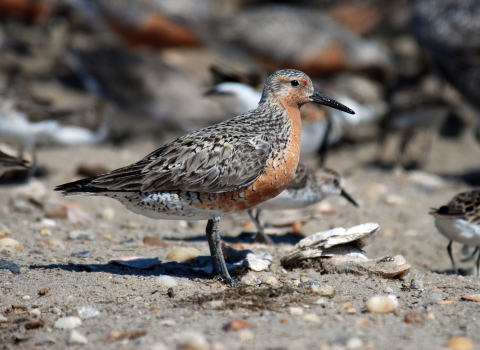Sometimes the world seems mighty big. What can one or two people really do to make an impact? In the case of Entiat National Fish Hatchery (NFH), create the best summer Chinook fishery in the Columbia River basin.
On July 10, 2019, Entiat fish made up 14% of all the summer Chinook across Bonneville Dam-- a giant proportion for a hatchery that releases just 400,000 fish annually. On July 11, staff fought to net lively, thrashing salmon in the hatchery's holding pond. These were surplus: fish that returned faithfully to the hatchery that weren’t needed for broodstock broodstock
The reproductively mature adults in a population that breed (or spawn) and produce more individuals (offspring or progeny).
Learn more about broodstock . Their destiny was to become food for the Coeur D'Alene tribe, members of whom watched with appreciation of the strength and beauty of the fish. Salmon for spawning had been separated into another, quieter pond already.
Entiat NFH is a small place, although its manager, Craig Chisam, doesn't like to think of it that way. Completed in 1941, the hatchery has raised a variety of different fish over the years, and was an important research facility early on, experimenting with fish feed and health. In 2009, the hatchery switched from raising spring Chinook, which they had done since 1979, to summer Chinook. The Complex provides excess fish to tribes as part of our mitigation responsibility. When Grand Coulee Dam cut off a third of the Columbia River to fish passage fish passage
Fish passage is the ability of fish or other aquatic species to move freely throughout their life to find food, reproduce, and complete their natural migration cycles. Millions of barriers to fish passage across the country are fragmenting habitat and leading to species declines. The U.S. Fish and Wildlife Service's National Fish Passage Program is working to reconnect watersheds to benefit both wildlife and people.
Learn more about fish passage , our three hatcheries were built to compensate, aiming to keep salmon numbers high and provide fish for tribes whose access to salmon was lost or impaired.
It took some time for the new program to prosper. Meanwhile, staffing declined to just two employees by 2016: manager Craig Chisam and maintenance worker Jason Reeves. Craig and Jason did extraordinary work, keeping the hatchery running for two years before additional staff joined them. 2018's returning summer Chinook were the result of this tremendous effort, as were 2019's.
In 2018, the Washington Department of Fish and Wildlife set a daily take of six summer Chinook on the Entiat River. This astounding bounty filled many local freezers. The purpose of the program is to establish a fishery on the Entiat River, and success is measured in pounds as anglers bring these enormous fish to the bank. The fishery was extended from Rocky Reach Dam to Wells Dam. Travis Maitland of Washington Department of Fish and Wildlife said locals love the fishery. "It's pretty exciting to fight such a strong fish in a small shallow river like the Entiat. Anglers should be ready by making sure their gear is up for the task of landing a fish that may approach 40lbs!" Nowhere else in the state that Travis knows of can anglers take six Chinook a day.
"These fish are monsters," Craig reported, and he and his crew have the aching bones from handling them to prove it. Why are Entiat fish so big and beautiful? Craig said, "It might have something to do with pride: the care we put into this facility and the fish." Greg Fraser of the Mid-Columbia Fish and Wildlife Conservation Office tracks returns of fish for the Leavenworth Fisheries Complex, of which Entiat NFH is a part. Greg explained that one reason for the large size of the fish could be ocean conditions where Entiat fish migrate. The Pacific Ocean is "patchy and dynamic." Salmon stocks occupy different areas of the ocean, which could explain why some runs do well in some years while others do not. Entiat’s summer Chinook are often caught in Alaska while still in the ocean. Greg said it's also due to "hatchery staff and their dedication to their craft."
The success of Entiat's summer Chinook was not guaranteed. Craig said he was forced to release fish in 2016 ten days earlier than normal. Black ash and silt washing downriver from fires the previous year choked the runways during high spring run-off. The fish were suffering, and working alone, he simply couldn't keep up. Consulting with Complex staff, he decided to let them go and hope for the best. It must have been the right decision, because they came back big, and beautiful.
That pride Craig feels was on display during the surplus. He was in the pond for hours with barely any breaks, along with Matt Cooper of the Mid-Columbia Fish and Wildlife Conservation Office, and Craig's two then-employees, Travis Collier and Becky Christopherson, until 524 fish had been packed into ice for the Coeur D'Alene to haul home. Their blistered hands, cramped muscles, and aching backs testified to their devotion. Even while they worked, they smiled with delight at particularly marvelous fish, admiring their salmon hour after hour. That kind of dedication is as beautiful as the fish.
The trend continued in 2020 and 2021, with huge, gorgeous fish returning in healthy numbers, and anglers lined up ready along the banks of the Entiat River and in boats on the nearby stretch of the Columbia River. Great summer Chinook returns to Entiat have become a new kind of normal. Let's hope the trend continues well into the future.








